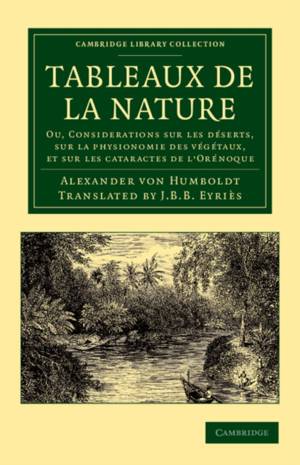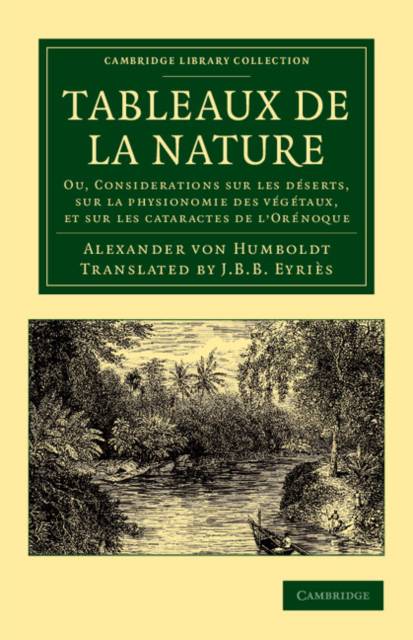
- Afhalen na 1 uur in een winkel met voorraad
- Gratis thuislevering in België vanaf € 30
- Ruim aanbod met 7 miljoen producten
- Afhalen na 1 uur in een winkel met voorraad
- Gratis thuislevering in België vanaf € 30
- Ruim aanbod met 7 miljoen producten
Zoeken
Tableaux de la Nature
Ou, Considerations Sur Les Déserts, Sur La Physionomie Des Végétaux, Et Sur Les Cataractes de l'Orénoque
Alexander Von Humboldt
€ 111,45
+ 222 punten
Uitvoering
Omschrijving
Alexander von Humboldt (1769-1859), 'the greatest scientific traveller who ever lived' according to Darwin, made groundbreaking contributions to the fields of geography, oceanography, climatology and ecology. In 1804, he returned from a five-year exploration of Latin America with an incredible wealth of specimens and data which provided the foundations for his theories on the natural order. He expounds them in this book, which was printed in German in 1808 before being translated by the geographer Jean-Baptiste Benoît Eyriès (1767-1846) and published in French in 1828. Humboldt does more than provide descriptions of the great features and phenomena of the Earth, ranging from the geological character of immense plains and steppes to the structure and action of volcanoes. He combines a rigorous scientific approach with his emotional and aesthetic responses to the natural world, thereby constructing a true 'philosophy of nature'.
Specificaties
Betrokkenen
- Auteur(s):
- Vertaler(s):
- Uitgeverij:
Inhoud
- Aantal bladzijden:
- 540
- Taal:
- Frans
- Reeks:
Eigenschappen
- Productcode (EAN):
- 9781108052757
- Verschijningsdatum:
- 2/08/2012
- Uitvoering:
- Paperback
- Formaat:
- Trade paperback (VS)
- Afmetingen:
- 140 mm x 216 mm
- Gewicht:
- 675 g

Alleen bij Standaard Boekhandel
+ 222 punten op je klantenkaart van Standaard Boekhandel
Beoordelingen
We publiceren alleen reviews die voldoen aan de voorwaarden voor reviews. Bekijk onze voorwaarden voor reviews.











